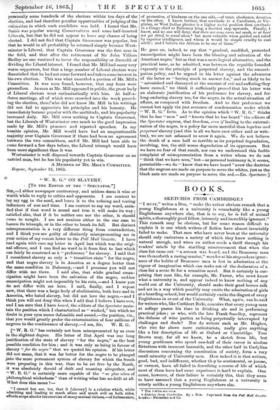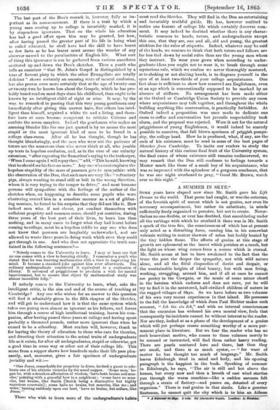-BOOKS.
SKETCHES FROM CAMBRIDGE.t
" I amsr," writes a Don, " make the rather obvious remark that a young Englishman at a university is remarkably like a young Englishman anywhere else, that is to say, he is full of anima/ spirits, a thoroughly good fellow, intensely and incredibly ignorant." This remark may be obvious, but for some reason difficult to explain it is one which writers of fiction have almost invariably failed to make. That men who have never been at the university should only caricature a society of which they know nothing is natural enough, and when an author sends a thrill through his readers' minds by the startling announcement that when the• class list came out " a scream was heard, and the Brasenose man was thenceforth a raving maniac," wonder at his stupendous ignor- ance of the habits of Brasenose men is lost in admiration at the vigour of imagination which can make out of the declaration of a. class list a scene fit for a sensation novel. But it certainly is sur- prising that men like, for example, Mr. Farrer, who must know what a university is, and appear indeed to know nothing of any world out of the University, should make their good heroes talk and act in a way which possibly may excite the admiration of girls at a boarding-school, but would certainly excite the disgust of every Englishman in or out of the University. What, again, can be said for writers who, like Cuthbert Bede, conceive that every young man at college passes his time in drinking ale and in performing practical jokes ; or who, with the late Frank Smedley, represent the dulness of wine parties as being perpetually interrupted by challenges and duels? Nor do writers such as Mr. Hughes, who rise far above mere caricaturists, really give anything like a fair description of life at Oxford or Cambridge. Tom Brown may, for all we know, be a sketch from life, but young gentlemen who spend one-half of their career in aimless flirtations with innocent barmaids, and the other half in Carlylian discussions concerning the constitution of society, form a very small minority of University men. How indeed it is that writers, good, bad, and indifferent, whether they be sentimental, or jocose, or earnest, have all failed in describing a course of life of which most of them have had some experience is hard to explain. One cause, however, of their failure is certainly this, that they seem to have assumed that a young Englishman at a university is utterly unlike a young Englishman anywhere else.
• The Italica are eels
Stekhes front Cambridge. By a Don. T:epr:nted from the Pall Mall G tte. lenadou : MacmIlhtn sad Co. The last part of the Don's remark is, however, fully as im- patent as its commencement. If there is a trait by which a young man coming up to college is invariably marked, rt. is by stupendous ignorance. That on the whole his education has had a good effect upon him may be granted, but how, after having passed the greater part of his life in being what is called educated, he shall have had the skill to have learnt so few facts as he has learnt must arouse the wonder of any observer unused to the peculiarities of English life. What sort of thing this ignorance is can be gathered from various anecdotes scattered up and down the Don's sketches. Thus a youth who tells an examiner "that St. John's Gospel is distinguished by a tone of fervent piety in which the other Evangelists are totally deficient " shows certainly an amusing state of mental confusion, bat also proves even more certainly- that at the age of twenty-one or twenty-two he knows less about the Gospels, which he has pro- bably heard read on most days since his childhood, than ought to be known by an intelligent child of eight or nine. It may, by the way, be remarked in passing that this very young gentleman may immediately after giving this answer have, like others less intel- ligent than himself, acquired a white tie and a living, and there- fore have at once become competent to criticize Colenso and confute the seven essayists. Indeed the gentleman who makes an amusing blunder like the one just quoted is by no means the most stupid or the most ignorant kind of man to be found in a tollege class-room. After all he has thought, though he has thought blunderingly, and the men who wear out the patience of tutors are the numerous class who never think at all, who jumble np texts in hopeless confusion, and, as in the case of one unlucky examinee, " after repeating the Samaritan's saying to the innkeeper, 4 When I come again I will repay thee,' " add, "This he said, knowing that he should see his face no more." Any one who contemplates the hopeless stupidity of the mass of passmen gets to sympathize with the observation of the Don, that such men are very like " refractory pigs, always wanting to stand still or bolt in the wrong direction, whom it is veal, trying to the temper to drive ;" and most humane persons will sympathize with the feelings of the author of the sketches when, on happening to describe some pupils who were chattering around him in a senseless manner as a set of gibber- ing maniacs, he found to his surprise that they did not like it. How indeed men who, if not clever, yet conduct themselves with sufficient propriety and common sense, should yet contrive, during three years of the best part of their lives, to learn less than nothing, and in many cases to forget what they had learnt before coming to college, must be a hopeless riddle to any one who does• not know that pasamen are laughably unierworkei, and are allowed to waste three years in doing work which even they could get through in one. And who does not appreciate the truth con- tained in the following sentences?— " Nobody comes to the University to learn. I may at least say that no one comes with a view to learning chiefly. I remember a youth who stated that he was learning mathematics with a view to. improving his mind. It became a standard joke against him ever afterwards. The ordinary undergraduate considered it equivalent to a confession of idiotcy. It savoured of priggishness to proclaim a wish for mental
• improvement, but to secure that object by mathematical study was almost incredible folly."
If nobody comes to the University to learn, what, asks the intelligent critic, is the aim and end of the course of teaching at Cambridge? Any one who wishes for an answer to this question will find it admirably given in the fifth chapter of the Sketches, and will get to understand how it is that the same system which takes one young man almost as ignorant as his fellows, and forces him through a course of high intellectual training, leaves his com- panion, after having passed three years at college and having spent probably a thousand pounds, rather more ignorant than when he ceased to be a schoolboy. Most readers will, however, thank us for leaving the theory of education to those who care for theories, and directing their attention to the actual traits of undergraduate life as it exists, for after all undergraduates, stupid or otherwise, get a good time in some way or other out of their college life. This scene from a supper shows how hundreds make their life pass plea- santly, and, moreover, gives a fair specimen of undergraduate joviality and wit:— "One Jones, remarkable for propriety in dress, invited a guest to cele- brate one of his athletic victories by the usual sapper. 'Some men,' be- gan he, with a drunken affectation of wisdom, 'have both brains andmns- ales,' pointing with a graceful bow to a neighbour ; some have no mus- cles, but brains, like Smith [Smith being a diminutive but highly sagacious coxswain] ; some have no brains, but muscles, like me ; and
some,' turning suddenly upon our host, have no brains, but collars, like Jones."
Those who wish to learn more of the undergraduate's habits must read the Sketches. They will find in the Don an entertaining and invariably truthful guide. He has, however omitted to notice one feature of college life which certainly deserves com- ment. It may indeed be doubted whether there is any charac- teristic common to heads, tutors, and undergraduates except this one, that they are, one and all, old and young, the greatest sticklers for the rules of etiquette. Indeed, whatever may be said of the heads, we venture to think that both tutors and fellows are far less tied down by social roles than are the young men whom they instruct. To wear your gown when according to under- graduate ideas you ought not to wear it, to break through some mysterious rule, which we confess we never thoroughly mastered, as to shaking or not shaking hands, is to disgrace yourself in the eyes of at least two-thirds of your college acquaintance. One fact alone is sufficient to show how reserved are Englishmen, even at an age which is conventionally supposed to be marked by an absence of stiffness. No arrangement has been made either at the Oxford or Cambridge Union Society to provide any room where acquaintance may talk together, and throughout the whole building anything like conversation, is practically forbidden. At Oxford indeed a proposition was once made to dedicate one room to coffee and conversation but juvenile respectability took alarm, and the proposal was rejected. Were it not for the natural priggishness of young Englishmen, it would indeed be scarcely possible to conceive, that full blown specimen of priggish pompo- sity, the college head. How he is produced, what, if any, are the ends of his existence, must be read in some of the best pages of Sketches from Cambridge. To incite our readers to study the natural history of this curious final fruit of the University system, the final cause of whose existence still remains undiscovered, we may remark that the Don still confesses to feelings towards a Master much like those of a small boy of his acquaintance, who was so impressed with the splendour of a gorgeous coachman, that he was one night overheard to pray, " Good Mr. Brown, watch over us this night."































 Previous page
Previous page